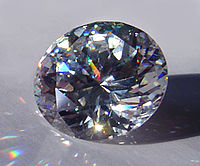
Photo from wikipedia
Abstract Tritium permeation through and corrosion of structural materials are critical issues in fusion reactor liquid lithium-lead blanket concepts from the viewpoints of an efficient fuel cycle, higher operation rates,… Click to show full abstract
Abstract Tritium permeation through and corrosion of structural materials are critical issues in fusion reactor liquid lithium-lead blanket concepts from the viewpoints of an efficient fuel cycle, higher operation rates, and radiological safety. In this study, lithium-lead compatibility of ceramic coatings has been investigated for the development of tritium permeation barriers with corrosion protection. Erbium oxide, yttrium oxide and zirconium oxide coatings were fabricated by a metal organic decomposition method on reduced activation ferritic/martensitic steel F82H substrates. Corrosion and delamination of the coatings were accelerated under a higher oxygen concentration. Under a lower oxygen concentration, zirconium oxide coatings had the best lithium-lead compatibility among three coating materials from surface and cross-sectional observations. However, the zirconium oxide coating after lithium-lead immersion at 550 °C for 500 h showed higher deuterium permeability in comparison to the sample without immersion. Formation of a chromium oxide layer on the surface of the substrate before fabricating the coatings drastically improved the lithium-lead compatibility of erbium oxide and yttrium oxide coatings. Degradation of the coatings was mainly caused by corrosion and delamination depending on immersion temperature, test duration, and impurity concentration.
Journal Title: Journal of Nuclear Materials
Year Published: 2018
Link to full text (if available)
Share on Social Media: Sign Up to like & get
recommendations!